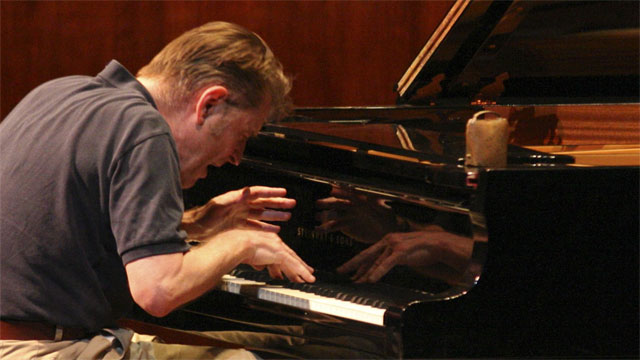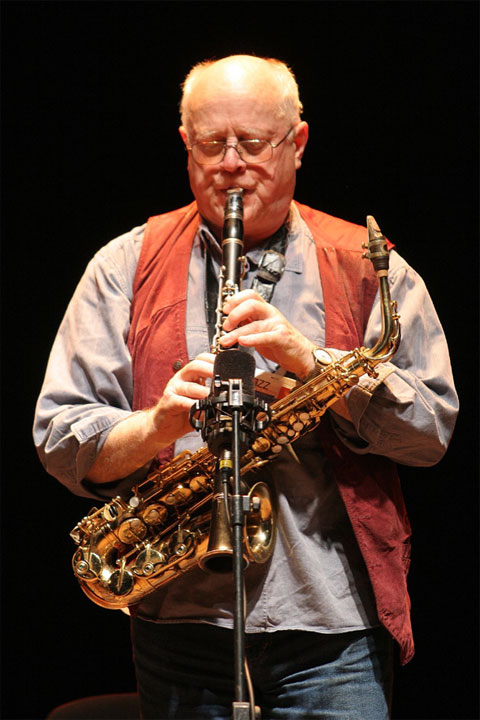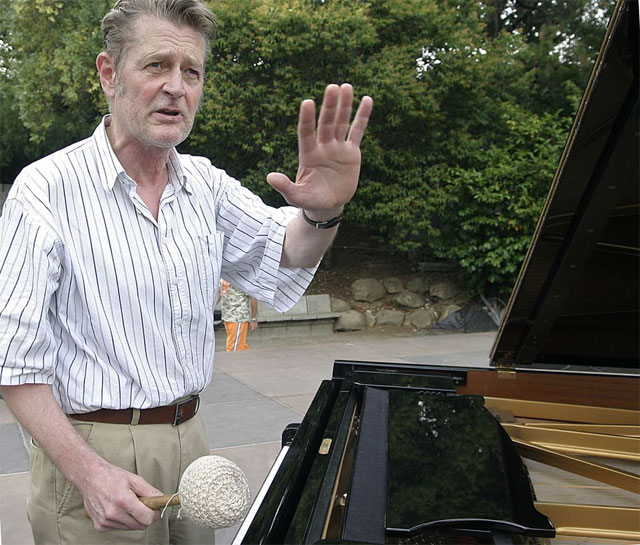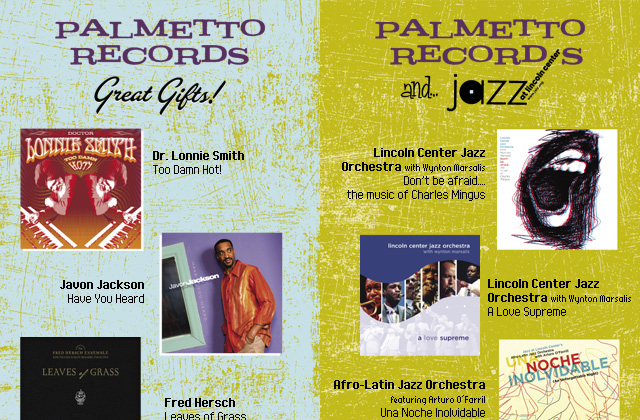Bill Shoemaker: Albert Mangelsdorff passed a few days ago. What is his legacy?
Alexander von Schlippenbach: He is a great figure, perhaps the most famous German jazz musician ever. He was much loved by many musicians. He played with Globe Unity for about 20 years and was always going for free improvisation during that time. He did many other things in other situations, but he was always strong in free improvisation. I have to say that.
Shoemaker: He was about 10 years older than you and was an established artist by the time you started Globe Unity in the ‘60s. What did he represent to you at that time?
Schlippenbach: The best. He could really play bebop. Being from Frankfurt, he was playing with many musicians from other countries, including the US, and often played on the radio, so he came into contact with a level of playing that few Germans were exposed to at that time. Later, he had his own bands, and they began to move away from bebop and started to compose their own pieces. That is when the Albert Mangelsdorff Quintet became quite famous, and The Goethe Institute sent them out on the road a lot. One of the reasons his group became famous was that they didn’t play just jazz compositions, but created pieces based on old German folk music. Now Jazz Ramwong became very famous because it had this very old German song on it. He was number one in Germany. So, it was some time before I could even play with him. I’m sure, at first, there were people who were surprised or even shocked that Albert played with Globe Unity, because it was this free jazz orchestra and he was Albert Mangelsdorff. But, I truly believe that his interest in free improvisation was part of what made him great.
Shoemaker: It’s interesting that you refer to Globe Unity as a free jazz orchestra. Joachim-Ernst Berendt famously referred to Globe Unity as the first free jazz orchestra. I think that characterization says a lot about the times in which you created Globe Unity. After all, Globe Unity began as a composition, and your early performances had more predetermined elements than, say, the band’s performances during the past 20 years or so. By contemporary standards, though, Globe Unity was very far from the norm.
Schlippenbach: Yes, it was. And you are right that the music got freer over the years and that when you look back, the early pieces were more composed or organized. But, at the time, it was different. It was when there was just the beginning of a movement in Germany and the beginning of similar movements in England and Holland that explored new forms of improvising and new forms of composing. In my case, I was also involved with what is called contemporary music, new classical music. I had studied composition with Bernd Alois Zimmerman and was interested in the Second Viennese School, particularly Schoenberg and Webern. So, for me, that was a moment where there was the possibility for me to create a new sound by not using traditional song forms or the sequence of changes that you have in traditional jazz. I tried to work out something based on twelve-tone scales. For the first Globe Unity piece, I had a twelve-tone row. From that, I tried to derive some forms for doing improvisation, like having a certain number of tones that could be used in variations. The twelve-tone row also gave me the possibility of working out some riffs that had a jazz rhythmic feeling – a bar repeated four or five times, that sort of thing. So, the composition had parts that used this twelve-tone material, but it was always intended to give a new space to the improviser, where he could create something new, out of impulse, from these composed elements.
Shoemaker: Globe Unity initially caused a great controversy in Germany. How did it feel to wake up one morning and be controversial?
Schlippenbach: Jah, it was quite interesting. You have to remember that our first performance was a great set-up by the Berlin Jazz Festival in 1966 and I got a commission to write the piece for that. The reaction was very strong. There were many people against it and many thought it was sensational. Some critics said it was the point where jazz was coming together with European classical music. There were many reactions for it and against it. So, I felt great. I felt that I was at the start of something that then went on until today.
Shoemaker: Did you feel that the critics who supported it had it right, that they really knew what you were doing?
Schlippenbach: Not so much. I think the idea that this was jazz and European classical music coming together was not the right way to think about it. For me, it was a very logical step forward for jazz, because that was the time – and not only in Germany, but also in Holland and in England – that the movement was beginning to happen. I like to compare it to what happened to European classical music at the beginning of the century, when it was ripe for change, and the change was coming out of the material itself. Whatever they wrote, whether they liked it or not, had nothing to do with my concerns. My concerns were the attitude and the approach of the jazz player. It did not have so much to do with what they call contemporary composition.
Shoemaker: Did your observations of these communities, particularly in England and Holland, influence your decision to create international ensembles for subsequent Globe Unity events?
Schlippenbach: Yes, definitely. Even before Globe Unity, we had played with Han Bennink and Willem Breuker a lot, and we had contacted English musicians like Evan Parker and Derek Bailey. There was not so much difference in the music that was being played in these different places. I think we all wanted to go in a new direction, we all knew where the music was then and where it had been, so we all were going in the same way, generally. We had the same interests, so we could play together very easily. It was a little bit later when they developed different ways of playing; but, in the beginning, we had a lot in common.
Shoemaker: That’s something that is not really stressed in the historical record. Maybe it is due to the fact that is was only after the Dutch had gone their way and the English theirs that they started making the records everyone references. In a way, it’s come full circle, because we now talk in terms of European Improvised Music, but by the 1970s, there were clear lines between their respective approaches.
Schlippenbach: What you are saying is true in some ways. But I heard them when there were many more similarities than differences, so when they did different things, it did not change that basic way I heard them and how they fit into the development of the band. From ’66 to ’70, we only played my compositions. Then there was the period where we played in Wuppertal many times and gave workshops. It was there that the concept changed a little, and we began to play pieces by other musicians. In that period, we also played Hans Eisler pieces, which came out kind of funny, I think. (Willem) Brueker did some arrangements, of course. We also played pieces by Anthony Braxton, Kenny Wheeler, and Manfred Schoof, so we were dealing with many concepts and composers at that time. From 1980 on, the focus has been completely free improvisation, no compositions and no pre-existing concepts.
Shoemaker: Does the change from playing compositions to playing free exclusively in the 1980s reflect a maturity, a coming of age, among European improvisers, which made it possible for 12 or 15 improvisers to meet and play in a more sophisticated way than in the 1960s?
Schlippenbach: Definitely, because this was something we created, instead of something we just carried on, like bebop. So, naturally, this is something that took a long time to develop. But, now we have a long story of how we discovered the possibility of playing together this way. If you look at it, it is just a sequence of tutti improvisations and solos. I think solos are important because, in my generation, jazz improvisations and solos were the same thing. When you played together, you stayed with the arrangement, maybe adding little things, but mainly playing the tune. So, soloing is a very important step to what we are doing as an ensemble. It is another important part of our performances that every musician has a solo. These things give our performances a general shape. In this long process, we found out some things that always come up in music and get more clear the more they come up. Perhaps that is form, but the performances always sound different, so it hard for me to say there is a conflict with the idea of free improvisation.
Shoemaker: You often refer to yourself as a jazz musician, and when I listen to Globe Unity, I hear a certain functional jazz approach in your playing, in terms of creating a center, not so much harmonically, but in terms of rhythm and clusters. Are you essentially comping?
Schlippenbach: Of course. The approach to rhythm is essentially something we learned from jazz. I try to give an impulse with the drums that drives the whole movement forward, because, to me, this is the most characteristic thing about playing jazz, that there is this forward moving force. That is what distinguishes jazz from other music. For me, my approach has something to do with swing, not swing in the old way, but more like raising a rhythmic intensity. And the other players have these impulses, too.
Shoemaker: In interviews, you usually cite Thelonious Monk and Cecil Taylor as influences; but, in your attack, particularly in this aspect of your playing with Globe Unity, I hear echoes of a pianist that I’ve never encountered in articles about you – Mal Waldron.
Schlippenbach: Ah. I know him very well. I like his playing very much. I do not consciously refer to him. I like what you say. Perhaps there is something there. But, if we are talking about influences, I would have to start at the beginning with the first jazz pianist I saw live, which was Oscar Peterson. I was quite amazed at the swing that he had, which was really something that I wanted to achieve. Later, it was Horace Silver. I used to have a quintet with Schoof and we played all of these Horace Silver pieces. We just copied them from the records. And Monk, of course, especially the compositions.
Shoemaker: It is somewhat unusual for a musician to be involved in a project for decades, like Globe Unity; but, you also have had a trio/quartet with Evan Parker and Paul Lovens for almost as long.
Schlippenbach: Yes, the trio started in 1970.
Shoemaker: They have continued roughly in parallel ever since. When I listen to your playing in both settings, there are some interesting comparisons and contrasts that can made. Do you make conscious choices about your playing in these different settings?
Schlippenbach: I think there is not so much of a difference, actually. Of course, when I play in the trio I have more space, and can do things all the time. I refer to different things that are going on in the ensemble. When one of the players is going strong, I try to fit into that. When there is a lot going – one of the tuttis – there is too much going on to respond to everything, so I try to play in a way that lets it happen in its own way.
Shoemaker: You spoke earlier about the different periods in Globe Unity’s evolution. Has something similar happened with the trio?
Schlippenbach: I think it is a really important point that we have mainly played in small jazz clubs. We used to tour a lot by car and play as much as we could. Now, we have one tour each year in December. I really think our style of playing was made by playing in those situations. We never rehearse any pieces, but we have done it for more than 30 years, so that there is a way that we play. It was grown in front of an audience. There was never any concept that we worked on, a theory or idea. We did not have this. We just played and played and found something we could do together. We found that it fits well.
Shoemaker: 35 years is a long time. Parker and Lovens must be doing something right.
Schlippenbach: (laughs) Yes, they do. The most important thing about Evan has to do with something I say about him: I call him Coltrane’s best pupil. He has the same attitude, very serious, very devoted to the thing that he is doing. He brought that way of playing to another level. It is different, but with the same attitude of going deep into the music. It comes close to what I feel about playing jazz and improvised music. I like Lovens because he is very quick. He has enormous quick reactions, and does surprising things. He always does something that brings a good tension as well as continuity.
Shoemaker: He has a very unconventional swing.
Schlippenbach: Yes. He is very familiar with many forms of jazz and used to play straight jazz in his early years. He was like Anthony Williams.
Shoemaker: Before he became Tony Williams.
Schlippenbach: Yeah, he did become Tony Williams, Anthony Williams.
Shoemaker: There are other musicians in Globe Unity with whom you have also had very long associations, like Manfred Schoof and Gerd Dudek. I think they make an important contribution to Globe Unity for the very reason that they still, for the most part, play jazz.
Schlippenbach: They are my oldest musical friends, because we started in the late ‘50s. I met Manfred Schoof when I arrived in Cologne to go to music school, which had the first jazz department in Europe. We used to play together almost every night in jam sessions. We played all the Horace Silver pieces and the Jazz Messengers pieces. So, I’ve known them from the beginning, when we were first trying to be ourselves. At the beginning of the ‘60s, there was a great influence of music from the US, so we listened to Ornette Coleman and Cecil Taylor as the records came to Europe. At this time, Ornette Coleman was a great impulse for us to write our own pieces outside of the conventional way, not using changes. Coleman made us think about themes and melodies as the basis for pieces. We went through this period together – Schoof, Dudek and me – which led us to try to find new ways of playing. Even though today they play in more conventional contexts, it’s no problem for us to play in our progressive way.
Shoemaker: I like the idea of progressive jazz, but it seems to becoming a thing of the past.
Schlippenbach: I don’t think so. It is still a very strong thing. So many times jazz has been called old-fashioned or even dead, and then something happens that says it is alive. There is a new generation of musicians in Berlin like Rudi Mahall, who is a good example of this. The spirit of bebop comes back in his playing, but in a new way. That’s what I find very interesting. Like Evan, who took Coltrane’s playing and made it into a new thing. The spirit of jazz is something that cannot die. It always resurrects in a new form. That’s been my experience. It will go on like that. I cannot imagine it any other way.
Shoemaker: I take it that these feelings were part of your decision to form the Berlin Contemporary Jazz Orchestra.
Schlippenbach: Yes. Globe Unity was at a certain point at the end of the ‘80s when we did not play so much, so we took a break from it. I was always interested in composition and I also wanted to play the compositions of contemporary jazz composers and players. But, it took a lot of organization and a lot of money from the Berlin cultural administration, which became more difficult as Berlin gave less and less money for culture. But, for about ten years, I was able to set it up every 2 years with Berlin radio, who gave us space for rehearsals and performances. I think the three CDs we did expressed our intentions.
Shoemaker: How would you compare your compositional sensibility during the early period of Globe Unity and during the period of the Berlin Contemporary Jazz Orchestra? What changed and what stayed the same?
Schlippenbach: I think the possibilities for my compositions became more rich through experience and contact with other musicians in the 20 years between. The influence of the other musicians I play with is always intense for me. I have more ideas now of what I can do through composition. But, it really depends on what musicians I’m working with. I have done many things and my approach has changed many times. At the moment, I am coming back to the idea of using twelve-tone material. I just recorded my solo record for Intakt, which will be called Twelve-Tone Tales. I had the fantastic opportunity to record for three days at the radio at Baden-Baden. I can imagine the possibility of using some of this material, if circumstances allowed the time to rehearse, with other musicians, as well. I think there is still a lot to discover with this approach.
Shoemaker: The twelve-tone approach seems to entail an interesting dynamic between discipline and freedom, in the sense that you end up creating something that you could not attain any other way.
Schlippenbach: Yes. Freedom is quite a dialectic thing. At the beginning, the material is quite strict, because I just stick with the tone row. Then, I like to do variations, not by writing them down, but by improvising them. At first, the variations are very small and are very slow. They take time. After I while, I have some material that I can bring together with my technical abilities and, then, you suddenly have it in the hands and then you can play with it. The twelve-tone thing gives you a new approach, because you have this material that you have to stick with. It also sets up a free atonality. There’s no pedal note or anything. But, you can get a certain bottom with it. So, there are things you can do with it, but it’s still more or less at the beginning. It’s a very different approach. Like most jazz musicians, I think in terms of chops, having chops and keeping them up. If I practice a lot, I keep my chops up and maybe they get a little better. But, it can work the other way. Sometimes you take a week or two off and your playing is fresh. For me, regular practicing is the way. That is the only way to keep it moving.
Shoemaker: I assume you really have to keep your chops up to play Monk, generally, and to do the Monk’s Casino project.
Schlippenbach: Just to play the compositions. I think his compositions represent an artistic achievement of the highest kind. If you compare him to Ellington, there are pieces by Ellington that are not great. But, every piece by Monk is a pearl, even just a 4-bar sequence like “Friday the 13th.” His pieces are so definite and so strict and convincing that they have always been fascinating to me. Some of them are quite easy to play in technical terms. “Locomotive” is a theme that a child could play. There are quite difficult pieces like “Four In One” and “Who Knows,” which is almost never played. But, the challenge is not a technical thing. In Monk’s music, you have to understand the melody. That’s what I learned from (Steve) Lacy. To understand the melody, you must know it in your head. You can’t sight-read them. You have to know every point where you put an emphasis, and this you can only learn by listening to how Monk played them.
Shoemaker: Our time is almost up. Anything you would like to add in closing?
Schlippenbach: Yes. I’m really glad that Globe Unity is reanimated. “Reanimated” is a funny word. When we played a concert in 2001, it had been about ten years since we played; but when we came together, it was like we never had stopped. What we had done was there, and we could play a great set. And, the result is there, on an Intakt CD. Since that time, we have played several times, so the band is back. And, next year is our 40th anniversary, and I feel it could go on now for some time.







